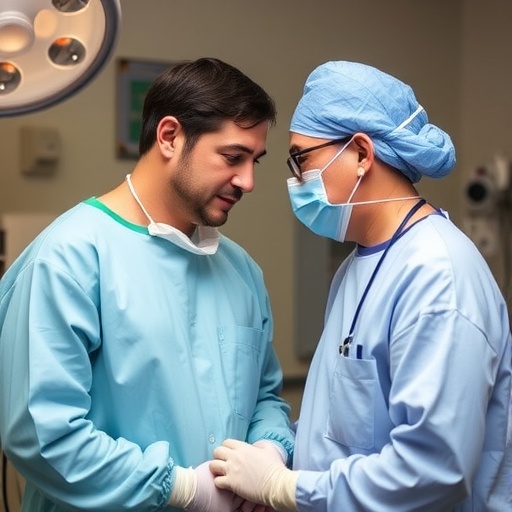In a groundbreaking study published in Biology of Sex Differences, researchers have delved into the intricate relationship between the surgical management of temporal lobe epilepsy and various cognitive, emotional, and quality of life outcomes. Temporal lobe epilepsy, a neurological condition characterized by recurrent seizures originating from the temporal lobes of the brain, can severely impact the well-being of affected individuals. This prospective cohort study led by Cano-López and colleagues assessed how gender and the laterality of surgical intervention influence cognitive and emotional recovery, aiming to fill gaps in existing literature.
The research carefully recruited participants undergoing temporal lobe epilepsy surgery, focusing on how different variables interact with neurological recovery. The study’s design encapsulated both qualitative and quantitative measures, allowing for a comprehensive understanding of the multifaceted outcomes associated with surgical treatment. The innovative approach not only considers the gender of patients but also includes the side on which the surgery is performed, an area often overlooked in previous research. This meticulous methodology sets a new standard for studying post-surgical recovery outcomes.
Cognitive assessments were performed using standardized tests that evaluated memory, attention, and executive functions. The results revealed a nuanced landscape of cognitive recovery based on gender differences and surgical side, indicating that male and female patients may exhibit divergent recovery trajectories. Interestingly, the side of surgery—left or right temporal lobectomy—also had unique implications for cognitive outcomes. This suggests that outcomes can vary significantly, reinforcing the importance of personalized approaches in treating epilepsy patients.
Emotional well-being was another critical aspect explored in this study. Through validated scales measuring anxiety, depression, and overall affectivity, the researchers gathered insights into how the surgical experience and subsequent recovery might differ between genders. The findings highlighted that women may experience heightened emotional distress compared to men post-surgery. This revelation could have profound implications for healthcare providers as they tailor support systems for individuals recovering from such invasive procedures.
Quality of life was evaluated using comprehensive questionnaires that captured various dimensions of well-being post-surgery. What emerged from the data was a clear link between cognitive and emotional health and overall quality of life. Notably, patients who reported better cognitive outcomes also tended to have improved emotional states, underscoring the interconnectedness of these domains. The research emphasizes how post-operative care must adopt a holistic approach, addressing not just the physical but also the psychological needs of patients.
Furthermore, the study shed light on the significance of gender-responsive healthcare in epilepsy treatment. By acknowledging the differences in recovery based on gender, the researchers advocate for a more tailored therapeutic approach that considers individual needs. This could potentially lead to more effective post-surgical interventions and improved outcomes, fostering a new paradigm in epilepsy surgery care.
As the research continues to garner attention, the implications extend beyond the operating room. The findings serve as a catalyst for further studies exploring the intersection of gender, cognitive function, and emotional health in other neurological disorders. For families and caregivers of epilepsy patients, the research adds another layer of understanding that could guide them in providing appropriate support during the recovery process.
Community engagement and dissemination of these findings are crucial in raising awareness about the complexities associated with epilepsy surgery. The research team advocates for greater visibility and discussion within healthcare circles, emphasizing that optimal patient outcomes hinge not only on technical surgical proficiency but also on a comprehensive understanding of patient psychology and gender considerations.
In navigating the complexities of post-operative care, clinicians may find themselves better equipped to foster effective recovery strategies tailored to individual patient profiles. This study lays critical groundwork for developing gender-sensitive healthcare practices that can significantly influence the long-term trajectories of those living with epilepsy.
In conclusion, this pioneering research illuminates the intricate factors influencing recovery in patients undergoing temporal lobe epilepsy surgery. By highlighting the roles of gender and surgical side, Cano-López and colleagues have opened new avenues for improving cognitive, emotional, and quality of life outcomes in this vulnerable population. As the field of neuroscience and epilepsy care continues to evolve, the call for personalized, holistic approaches becomes increasingly apparent, ensuring that all patients receive the comprehensive care they truly deserve.
In a landscape where effective treatment and recovery strategies are paramount, this study not only expands the body of knowledge surrounding temporal lobe epilepsy but also sets a precedent for future interdisciplinary research that can bridge the gaps in our understanding of complex neurological conditions.
Subject of Research: Impact of gender and surgical side on cognition, affectivity, and quality of life in temporal lobe epilepsy surgery patients
Article Title: Impact of gender and side of surgery on cognition, affectivity, and quality of life in patients undergoing temporal lobe epilepsy surgery: a prospective cohort study
Article References: Cano-López, I., Catalán-Aguilar, J., Hampel, K.G. et al. Impact of gender and side of surgery on cognition, affectivity, and quality of life in patients undergoing temporal lobe epilepsy surgery: a prospective cohort study. Biol Sex Differ 16, 87 (2025). https://doi.org/10.1186/s13293-025-00775-8
Image Credits: AI Generated
DOI: https://doi.org/10.1186/s13293-025-00775-8
Keywords: Temporal Lobe Epilepsy, Cognitive Function, Emotional Health, Quality of Life, Gender Differences, Surgical Outcomes, Prospective Cohort Study.
Tags: cognitive assessments in epilepsy patientscognitive functions post-surgeryemotional recovery after surgeryepilepsy management and patient well-beinggender differences in cognitive recoveryimpact of gender on health outcomesinnovative methodologies in medical researchlaterality of surgical interventionneurological recovery in epilepsyprospective cohort study on epilepsyquality of life in epilepsy patientstemporal lobe epilepsy surgery outcomes





